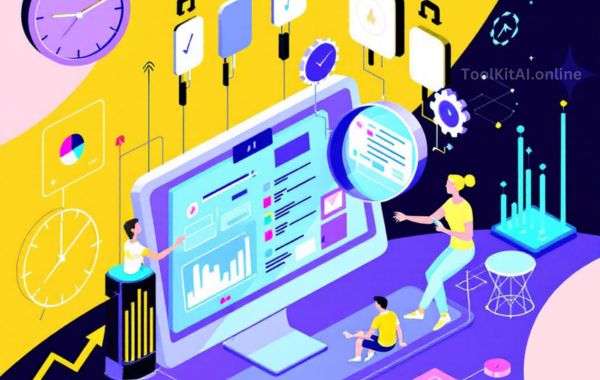Small businesses today have a wide array of AI tools available to help optimize operations, reduce costs, and drive growth. But with new solutions emerging constantly, it can be hard to quantify just how many options exist. This article provides a comprehensive overview of the AI tools and solutions tailored for small business needs across key functional areas.
AI adoption among small businesses is accelerating, with a recent Small Business Trends study finding that nearly one third of small firms are using AI technologies. This is being driven by AI’s potential to automate tasks, extract insights from data, and engage customers more effectively.
But with new AI tools launching regularly, how many options exist today for small businesses? Our analysis indicates there are over 100 AI tools and solutions specifically designed for small business needs, spanning core functions like marketing, sales, customer service, HR, accounting, and more.

We categorize the main types of AI tools available and provide examples of leading solutions in each category in the table below:
| AI Tool Category | Examples |
|---|---|
| Marketing Automation | Mailchimp, HubSpot, ActiveCampaign |
| Sales Enablement | Gong, Chorus.ai, Outreach |
| Customer Service | Zendesk, Intercom, Drift |
| HR & Recruiting | Cognilytica, Phenom |
| Accounting & Finance | Bill.com, Float |
| Supply Chain & Inventory | Shipedge, Addepto |
Now let’s explore the key AI capabilities transforming small business operations and the top tools in each area.
AI for Marketing Automation
Marketing automation tools like HubSpot and ActiveCampaign integrate AI capabilities to deliver more personalized and timely content to customers. Key features enabled by AI include:
- Predictive lead scoring
- Dynamic email and web content personalization
- Automated social media posting
- Intelligent nurture campaigns
- Sales readiness analysis
These AI-powered solutions help small businesses scale their marketing efforts and drive higher conversion rates.
AI for Sales Enablement
AI sales tools like Gong and Chorus analyze sales call data to uncover insights for improving pitches and presentations. Key AI capabilities for sales enablement include:
- Speech and sentiment analysis
- Pattern recognition in winning sales approaches
- Predictive analytics for forecasting
- Data-driven tips for better prospect engagement
By leveraging these AI technologies, small sales teams can have the right strategies to close more deals.
AI for Customer Service
Customer service AI helps small businesses deliver more responsive and personalized support. Key features enabled by AI include:
- Smart virtual agents and chatbots
- Natural language processing for sentiment analysis
- Contextual recommendations for agents
- Automated knowledge base construction
- Predictive analytics to anticipate customer needs
Top tools like Zendesk and Intercom allow small customer service teams to provide a high-quality experience at scale.
The Bottom Line
With over 100 AI tools tailored for small business, it’s clear that AI adoption is increasing. The key for small businesses is identifying which AI capabilities offer the highest value. By starting with a strategic pilot implementation in one area like marketing or sales, small businesses can validate the benefits before expanding AI capabilities across the organization. The result is optimized workflows, lower costs, and the ability to better serve customers.